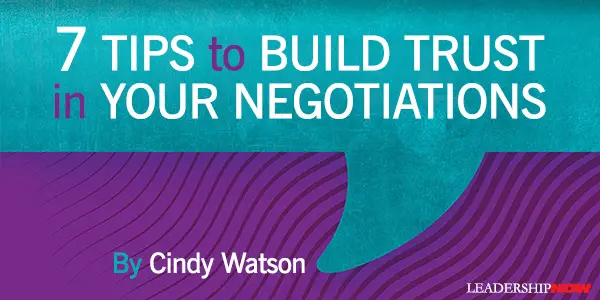 |
 |
05.15.23

7 Tips to Build Trust in Your Negotiations
TRUST is a cornerstone of effective negotiations. From trusting yourself to building trust with the other party, trust itself improves long-term outcomes, relationships, and buy-in. Yet we often don’t give it the attention it deserves. We rarely include intentional trust-building as part of our preparation work for negotiations, and this is a mistake. Failing to build trust adversely impacts your ability to influence and persuade other people. In other words, it undermines your effectiveness as a negotiator. What is trust, exactly? For a long time, experts couldn’t agree on how to define trust, let alone how to build it. There were widely divergent opinions across multiple disciplines on the causes of trust, its nature, and its impact. Everyone agreed it was important, but nobody agreed on why or how. A 1995 Academy of Management Review journal article, “An Integrative Model of Organizational Trust,” is often cited for its breakdown of the factors of trustworthiness. It suggests three factors determine whether we find someone trustworthy: Ability: Do I believe the person has the ability to deliver on their promises?
Drawing on this model over a decade later, Stephen M. R. Covey broke the concept of trust into two components: character and competence. Character reflects integrity and intent. Competence draws on capabilities and results. Would you pass the “trust test” based on these qualities? It’s worth asking yourself this question in advance of every negotiation. Women Have a Trust Advantage Surprisingly, women have an edge on the trust front. Justified or not, people tend to trust women more. But why? Perhaps it’s because women aren’t regarded as threats, given their smaller stature and historical lack of power in business and politics. Perhaps it’s because women are more open with their emotions, which is perceived as transparency and candor. Or maybe it’s the perception that women are more likely to ensure everyone’s voice is heard. Someone suggested to me recently that it’s because women are thought of first as mothers and nurturers. Whatever the rationale, it translates to increased innate trust, a definite asset in negotiations. Tips For Building Trust In our fast-paced world, decisions are made quickly. Our speedy determinations are often based on knee-jerk check-ins about whether we trust the other party—or not. So, what can you do to establish this trust? 1. Trust yourself Your first and most important negotiation tool is your own mindset. Building trust with others is hard if you don’t trust yourself. You need to respect yourself to attract the respect of others. Where should you start? Explore the limiting beliefs that have held you back, challenge your inner critic, seek internal versus external validation, be honest with yourself, and celebrate your value. 2. Maintain your reputation Losing trust is easier than building it, and it can take a considerable investment to regain trust once it’s lost. Managing your reputation is key. Being known as someone who is untrustworthy can be the kiss of death in negotiations. So always guard your reputation. 3. Give respect Respect and trust are closely connected. Always treat people with dignity and respect if you expect the same. Doing so builds trust. 4. Bring empathy to the table Be sure to practice active listening. Seek to truly understand the position and needs of the other party. This will lower their defenses and increase their trust. 5. Speak clearly When I say, “Speak clearly,” I’m not talking about diction (although that doesn’t hurt) but rather about being clear about your meaning. Say what you mean and mean what you say. Be transparent and open when possible. Also, speak the “language’” of the other party, using terminology that speaks to them. As an attorney, I learned long ago to master the specialized lingo of my clients. Imagine representing the trucking industry as an attorney without knowing the difference between a truck tractor and a flatbed. You’d lose the client’s trust instantly. The same applies in every sector and industry. 6. Seek mutual gains Approach negotiations with the goal of finding the highest good for all. Don’t just seek to have your needs met; actively look for creative opportunities to find mutually beneficial solutions and outcomes. As you do, be prepared to make concessions as a stepping stone to building trust. But don’t randomly offer up items as a compromise. Instead, be intentional about it. Strategize in advance so you can offer up concessions that will be of value to the other side but are easy gives for you. Name your concessions as you give them. Don’t expect the other party to recognize the concession you’ve made or its value. 7. Be clear about your expectations When identifying your needs in a negotiation—which comes after listening to the other party’s demands—don’t be vague or clever. Be clear. Be prepared to explain your needs. It’s surprising how often we misperceive and attribute false motivations to the other party. You can avoid this problem by offering your explanations in advance to assist in their understanding of your perspective. Communication builds trust. Trust Is a Process Once we master trusting ourselves, trust involves a willingness to rely on someone else. There’s a vulnerability inherent in the giving of it, and our past hurts often make this challenging. Exploring how to give trust allows us to become more trustworthy. It takes intentional practice—and it’s worth it.  
Posted by Michael McKinney at 06:59 AM
|
BUILD YOUR KNOWLEDGE
 

How to Do Your Start-Up Right STRAIGHT TALK FOR START-UPS 
Grow Your Leadership Skills NEW AND UPCOMING LEADERSHIP BOOKS 
Leadership Minute BITE-SIZE CONCEPTS YOU CAN CHEW ON 
Classic Leadership Books BOOKS TO READ BEFORE YOU LEAD |